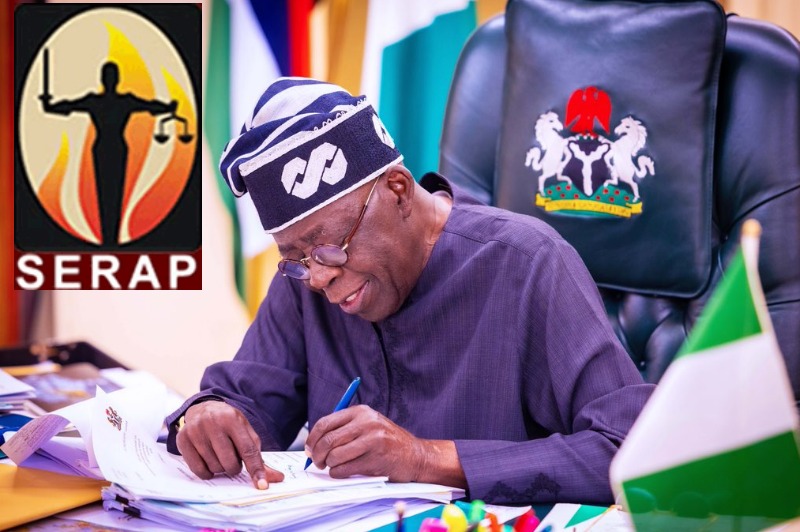
Calls for Tinubu to Publicize Assets as He Marks First Anniversary as President
SERAP Urges President Tinubu to Publish Assets on First Anniversary in Office
The Socio-Economic Rights and Accountability Project (SERAP) has called on President Bola Ahmed Tinubu to publish his assets as he marks the first anniversary of his presidency.
SERAP emphasized that this occasion provides an opportunity for Tinubu and other elected officials to demonstrate their commitment to democracy, accountability, and transparency by immediately making their asset declaration forms public.
The organization also urged the President to propose a constitutional amendment to create an asset declaration database, ensuring the publication of asset declarations of government officials before, during, and after their tenure.
In a letter, SERAP’s deputy director, Kolawole Oluwadare, stated: “Widely publishing your asset declaration form and encouraging your Vice-President, ministers, and state governors to also publish their assets would serve legitimate public interests.”
He added that such actions would promote public trust, transparency, accountability, and public participation, strengthening Nigeria’s democracy and ensuring accountability at all levels of government.
SERAP referenced Tinubu’s inaugural speech on May 29, 2023, where he promised to take proactive steps to discourage corruption and govern impartially according to the constitution and rule of law. SERAP urged him to use his first anniversary in office to reaffirm this commitment by implementing the proposed recommendations.
Transparency in asset declarations, according to SERAP, would allow Nigerians to scrutinize the financial situations of public officials, identify potential conflicts of interest, and detect corruption. Publishing these forms would also demonstrate public officials’ accountability and integrity, fostering trust in government.
The organization highlighted that asset declaration forms are a matter of public interest and called on the government to provide leadership by making these details available online. Transparency and openness, SERAP argued, are essential in combating corruption, enhancing public confidence, and ensuring honest governance.
SERAP’s requests align with the Nigerian Constitution and international anti-corruption and human rights obligations, asserting that public access to officials’ property and economic interests is crucial. They stressed that public officials, as trustees of Nigeria’s wealth, have a fiduciary duty to be open and accountable.
Finally, SERAP stated that publishing asset declarations would not violate privacy rights due to the overriding public interest in transparency. This step would allow Nigerians to scrutinize public officials’ assets before and after their terms, sending a powerful message of commitment to upholding constitutional and international obligations.
“According to the Code of Conduct for Public Officers, contained in Part I of the Fifth Schedule to the 1999 Nigerian Constitution 1999 [as amended], all public officers are to declare their assets.
“Paragraph 11(1)(a)(b) of the Fifth Schedule provides that every public officer shall immediately after taking office and thereafter (a) at the end of every four years; and (b) at the end of his/her term of office, submit to the Code of Conduct Bureau a written declaration of all his properties, assets, and liabilities and those of his unmarried children under the age of eighteen years.
“Section 15(1) of the Code of Conduct Bureau (CCB) and Tribunal Act also requires all public officers to declare their assets.
“Article 7(1) of the African Union Convention on Preventing and Combating Corruption and Articles 7(4) and 8(5) of the UN Convention against Corruption also contain similar provisions and requirements for public officials to declare their assets before, during, and after serving in public office.
“The Nigerian Constitution and the anticorruption and human rights treaties show the significant role that asset declaration by public officials plays in promoting transparency, accountability and preventing and combating corruption in the public service.
“Section 109 of the Evidence Act defines a public document to include documents forming the acts or records of the acts of public officers. Asset declaration forms kept with the Code of Conduct Bureau therefore qualify as public documents under section 109.
We hope that the aspects highlighted will help guide your steps in publishing your asset declaration form and encourage others to do the same.